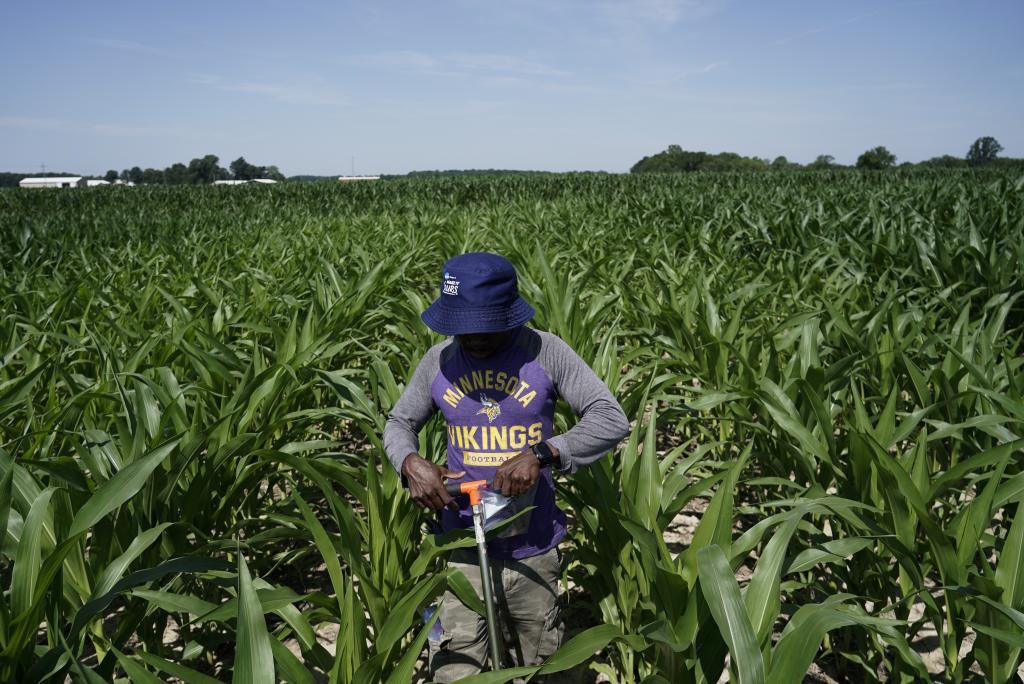And April 2 arrived, the D-Day of Donald Trump's major trade war against Europe. He has dubbed it as "Liberation Day," but privately his team drops the euphemisms and calls it by its name: it is a revenge against the EU for its commercial superiority. The US government will announce today a "big bang" of tariffs to coercively "balance" what it has not been able to match by competing on equal terms.
This is demonstrated by a "confidential" report prepared by the "mission to Washington DC" of the COPA-Cogeca leadership, the organization representing 22 million European farmers and cooperatives. This "delegation" met in mid-March with representatives of the Trump Administration. The content of the meetings was kept strictly confidential, but EL MUNDO has accessed the document that details all the confidences of the high representatives of Trade, Foreign Affairs, and Agriculture of the US.
The report, with a huge watermark that says "Confidential," recounts the initial contacts with the Office of the US Trade Representative (the powerful USTR). On March 18 and 19, the European delegation met, among others, with technical profiles like Julie Callahan, who conveyed that "the surplus enjoyed by the EU is too large" and needs to be "rebalanced" not only in global terms but also with a "tailored approach" to each "EU member state." In other words, with a special emphasis on Germany, Ireland, and Italy, the countries "with which there is a deficit." To "ensure a level playing field," what the Trump team demands is "a reward for the EU's non-tariff barriers."
The European agricultural leadership found that many "key individuals" in the US Administration are not yet appointed, but that has not stopped Trump from accelerating his plan. Everything revolves around his tariff guru, Peter Navarro, whom everyone mentioned in the meetings as the person "leading" this trade war.
In any case, the COPA and Cogeca executives also met with high-ranking officials like Jason Hafemeister, Undersecretary for Trade and Agricultural Affairs. He told them that "the EU will have to accommodate and accept the rules" of the US. Period. And he added that, as "the US wants fair trade for its farmers," on April 2, today, there will be a commercial "big bang" that will force, "through tariffs," the trading partners of the world's leading democratic power to "make the necessary adjustments." There will be no negotiation. It will be imposed.
For the USTR, concerns about the "barriers" that the EU imposes on US exporters are "legitimate" because "they are not based on science." Navarro has targeted the VAT. "The VAT policy is considered an export subsidy," Hafemeister told them, as noted by the Secretary-General of European farmers, Elli Tsiforou, in her report. And he emphasized the same idea of a "tailored response," country by country.
On paper, this reduces pressure on the Spanish agricultural sector and agri-food industry - the second most important in the country after tourism. Why? Because, unlike Germany, Spain has a trade deficit with the US. In 2024, it exceeded 10 billion, after exporting goods worth 18.179 billion and importing 28.192 billion, mainly due to energy purchases.
US officials and government leaders confessed to their European counterparts that, unlike Joe Biden, the new administration "does not have much regard for the World Trade Organization, which they consider a creature of the 50s." The anti-globalization message they conveyed is very relevant: "Global integration used to interest the US, but not anymore. The rules-based trading system has mistreated the United States. The rules-based trade must be replaced by results-based trade."
The delegation also met with business leaders, agricultural unions, and EU officials in Washington, such as Michelangelo Margherita, who concluded that both "cuts in the Administration" carried out by Elon Musk and tariffs "are related to tax reform," as Trump wants to "free up" money for tax cuts. And the EU ambassador to the country, Jovita Neliupien, provided them with two ideas. The first one, clear and straightforward: "The Trump Administration does not like the EU." The second, more qualitative: "Many Republicans are very concerned, but they are afraid."
The meetings with agricultural representatives were very fruitful because they were able to gauge that their opinion on this new trade policy is quite negative. Zippy Duvall, President of the American Farm Bureau Federation, said that Trump "wants to shake things up," but that producers "do not really know what the long-term plan is." And they are concerned about the volatility and instability. "Rural voters like" the idea of downsizing the federal government and "draining the swamp," he added, but at the same time, "fears are increasing about how that will affect things on the ground" because essential employees of the Department of Agriculture (USDA) have been lost.
American farmers fear that tax reform "endangers" the funding of the new Farm Bill. They are concerned about the "new policies" of Robert F. Kennedy, Secretary of Health. Kevin Natz, Vice President of the National Council of Farmer Cooperatives of the US, was very clear: "Everything is happening too fast; too much uncertainty is not good for business." And Rob Larew, President of the National Farmers Union, emphasized that "tariffs are frowned upon by the agricultural community." "They harm the consumer and benefit no one," he summarized, as the concluding remark of the trip.
